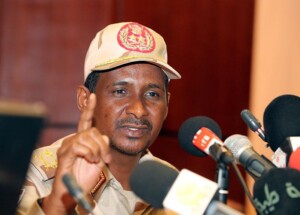Case filed against eastern Sudan leaders for ‘sabotaging the national economy’
The protests actions called for by eastern Sudanese community leaders in September, including the blocking of access to the ports in Red Sea state and closure of the pipelines transporting oil from Sudan and South Sudan to Port Sudan for export, have led to the filing of a case against the nazirs.
 Eastern Sudanese protestors call for the cancellation of the Eastern Sudan peace protocol, Telkok, Kassala, December 12, 2020 (Social media).
Eastern Sudanese protestors call for the cancellation of the Eastern Sudan peace protocol, Telkok, Kassala, December 12, 2020 (Social media).
The protests actions called for by eastern Sudanese community leaders in September, including the blocking of access to the ports in Red Sea state and closure of the pipelines transporting oil from Sudan and South Sudan to Port Sudan for export, have led to the filing of a case against the nazirs*.
A number of members of Resistance Committees in Khartoum lodged an official complaint on Monday against Beja leaders for undermining civil state authority, threatening the transitional period, inciting hatred, violence and tribalism, and sabotaging the national economy by blocking railways and pipelines transporting petrol, and closure of the railways and the highway linking Khartoum with Port Sudan.
The Sudan News Agency (SUNA) reported on Tuesday that lawyer Eman Abdelrahim, journalist Ahmed Saeed, and activist Abdallah Ali and others representing the Resistance Committees in the Sudanese capital filed the lawsuit at the Prosecution Office of Crimes against the State and Terrorism “on the basis of common right”.
The Prosecution has requested the Red Sea state authorities to verify the closure of the pipelines, the railways and highway between Khartoum and Port Sudan, and provide an overview of the extent of the losses caused by the protest actions of the Beja against the Eastern Sudan track protocol of the Juba Peace Agreement, signed on October 3 last year.
Eastern Sudan Track
The Eastern Sudan Track was negotiated and signed by Ababda tribe leader Osama Saeed, Chairman of the Beja Congress in Opposition, and Beni Amer leader Khalid Shaweesh, Head of the Popular Front for Justice. The High Council of Beja Nazirs and Independent Chieftains was not involved in the talks. So far, they have not clarified what they are opposed to in particular. They demand the entire protocol to be cancelled and call for an inclusive eastern Sudan conference to decide on the future of the region.
The Beja nazirs have opposed the Eastern Sudan Track since it was agreed upon by the Sudanese government and the Sudan Revolutionary Front rebel alliance in Juba in February 2020.
In September last year, the Beja council organised a Peace, Development and Justice Conference in Sinkat, Red Sea state, during which they demanded the right to self-determination for eastern Sudan if the government would not listen to their demands and cancel the eastern Sudan peace protocol. In December, thousands of people attended a large gathering against eastern Sudan Track in Telkok in Kassala.
The High Council of Beja Nazirs and Independent Chieftains announced larger protest actions in Red Sea state, Kassala, and El Gedaref last month, to put more pressure on the Sudanese government to cancel the Eastern Sudan Track protocol.
The Beja chiefs this time also demanded the formation of a government of technocrats. “We demand a competent government as the current partisan government is too slow in responding to our demands,” Beja Nazirs Council spokesman Abdallah Obshar told Radio Dabanga on September 20.
Following a visit of a high-level government delegation from Khartoum last weekend during which was agreed to continue negotiation meetings the following week, the blockades of the pipelines were lifted. The ports and the main roads are still blocked.
The protest actions of the Beja led to counter demonstrations in Red Sea state, Kassala, and El Gedaref last Saturday. It was said that “affiliates of the former regime” were behind the road closures. The protestors called for accelerating the implementation of the Eastern Sudan Track and pointed to the duty of the security forces to protect public assets from being blocked.
* A nazir is a state-appointed administrative chief of a tribe or clan, according to the Native Administration system in Sudan introduced by the British colonial authorities in the first quarter of the twentieth century.











 and then
and then